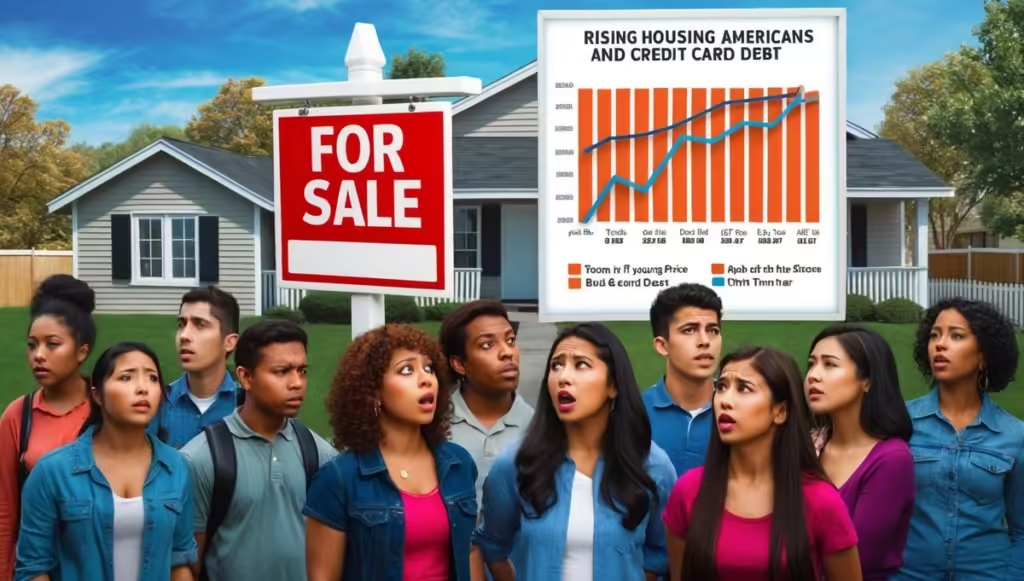Introduction
The American dream of homeownership is slipping away for young Americans. With rising credit card debt, soaring housing prices, and economic instability, the younger generations face unprecedented challenges. A recent speech sheds light on these issues and suggests how immigration policies could be influencing the housing market, making it increasingly difficult for millennials and Gen Z to secure their financial future.
Impact of Rising Credit Card Debt on Millennials and Gen Z
Young Americans today are burdened with more credit card debt than any previous generation. This debt is often fueled by rising living costs and stagnant wages, making it harder for them to save for down payments or qualify for mortgage loans. According to recent statistics, average credit card debt has reached an all-time high, which, when combined with student loans, is crippling the ability of young people to buy homes and build wealth for their families.
Key Points:
- Millennials and Gen Z are entering the workforce with record-high student loan debt.
- Rising living costs, coupled with inflation, have forced many to rely on credit cards, pushing debt levels up.
- With current interest rates, carrying high credit card debt can severely affect mortgage qualifications.
Housing Affordability Crisis and Its Connection to Immigration Policies
One of the most overlooked factors impacting housing affordability is the current immigration policies. The speaker argues that an influx of undocumented immigrants has created additional demand for housing, driving prices up in many urban areas. As a result, many young people find themselves priced out of the housing market.
Key Points:
- Increased population growth from undocumented immigrants raises demand for housing.
- Housing prices in cities with high immigration rates are significantly higher.
- American veterans and citizens often struggle to find affordable housing while some new arrivals are placed in government-supported accommodations.
How Immigration Affects American Job Market and Wages
The speaker suggests that the labor market has been impacted as well, with competition for low-wage jobs intensifying due to the presence of undocumented workers. This has led to stagnating wages in several sectors, further hindering young Americans’ ability to save for homeownership.
Key Points:
- Undocumented workers increase competition for low-wage jobs, which suppresses wage growth.
- Stagnant wages make it challenging for younger generations to save money for down payments.
- The speaker advocates for tighter immigration control to ensure better wage prospects for American citizens.
Educational and Healthcare Systems Under Pressure
The speaker points out that the increasing number of undocumented immigrant children in the school system is straining educational resources, particularly in states like Michigan, which reportedly has 85,000 children of undocumented immigrants enrolled in public schools. Similarly, hospital wait times have soared, as more people require healthcare services, yet resources remain limited.
Key Points:
- Teachers face challenges in educating classrooms with students who have language barriers.
- Resources are stretched thin, impacting the quality of education for American students.
- Hospital emergency room wait times have increased, making it difficult for citizens to access timely care.
Calls for Policy Change: Prioritizing Americans First
The speaker concluded by calling for a return to policies that prioritize American citizens, such as making housing more affordable, reducing the burden on educational and healthcare systems, and ensuring that young Americans have the opportunity to build wealth and achieve the American dream. They believe that a change in political leadership is necessary to bring these priorities to the forefront and address the issues facing today’s youth.
Key Points:
- Advocates for stricter immigration control to reduce the burden on housing, education, and healthcare.
- Proposes policies aimed at reducing credit card debt and making homeownership more attainable.
- Believes that American homes should be reserved for citizens rather than being allocated to undocumented immigrants.
Conclusion
With rising debt, limited housing options, and a strained job market, young Americans are struggling to secure their future. The speaker’s message emphasizes that addressing these issues starts with rethinking immigration policies and focusing on solutions that put American citizens first. As the country moves forward, these discussions will be crucial in shaping a more prosperous future for the younger generations.

